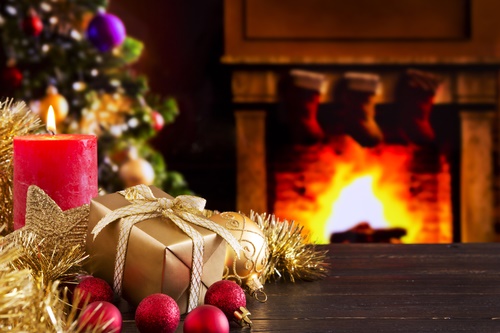
ALEXANDRIA, Virginia, Dec. 17, 2015 — The holiday season is brightened with creative decorations using candles and electric lights, and colder weather offers the chance to finally start cozy fires in unused fireplaces. Unfortunately, winter is also a prime time for fire-related injuries, property damage and even deaths. Trusted Choice® agents and spokespeople can help families prepare for fire risks and hazards that may come during the colder months.
“Winter and the holidays bring many risks for fires,” says Madelyn Flannagan, Big “I” vice president of agent development, education and research. “Taking some time to ensure that your home is protected against fire hazards can prevent thousands of dollars in damage, unnecessary headaches and potentially save lives.”
Lighting and Flames
According to the National Fire Protection Association, in 2014 alone, more than 3,000 civilians died from fires and almost 16,000 were injured. Additionally, 97 firefighters died and almost 66,000 were injured in the same year.
To help families and businesses enjoy the holiday season and protect themselves against winter fire risks, Trusted Choice® agents and the Big “I” officer the following tips to ensure a fire-safe home this winter:
• COOKING FIRES: Cooking is the number one cause of home fires. Never leave anything cooking unattended and keep a fire extinguisher in your kitchen.
• CANDLES: Avoid using lit candles. If you do use candles, make sure they are in stable holders and place them where they cannot be easily knocked down. Also keep them out of the reach of children and pets. Never leave a home, or even a room, with unattended candles burning.
• SMOKE ALARMS: Install a smoke alarm on every level of your home. Test the batteries each month and change them at least once a year.
• CHIMNEYS: Have the chimney, chimney vent and flue cleaned and inspected annually. Never burn trash or wood that is painted or pressure-treated inside the home. Never put Christmas tree branches or needles in a fireplace or wood-burning stove.
• FUELS: Never use gasoline or other alternative fuels in a kerosene heater.
• CHRISTMAS TREES: A dry Christmas tree in the house can act as kindling for a fire. A tree should never be placed close to a heat source, including a fireplace, heater, candle or a heat vent. The heat will dry out the tree faster, causing it to be more easily ignited by heat, flame or sparks. Keep fresh trees watered at all times. When a Christmas tree becomes dry, promptly discard it.
• HOLIDAY LIGHTS: Inspect all decorative lights for frayed wires, bare spots, gaps in the insulation, broken or cracked sockets, and excessive kinking or wear before putting them up. Inspect them again when you take them down. Do not leave lit decorative lights unattended and only use UL approved lighting. Check to see if lights are indoor or outdoor lights before putting them up.
• OUTLETS: Do not overload outlets and use surge protectors. Connect strings of lights to an extension cord and/or surge protector before plugging the cord into the outlet.
• THE ELDERLY: Check on older adults and help them inspect their homes and holiday decor. Older people have a higher risk of injury from fires and are also more likely to die in fires or of fire-related injuries than those in younger age groups.
Keeping Warm
There are more ways to keep warm than just using the fireplace. Here are a few suggestions:
• Never leave fireplaces, woodstoves or space heaters unattended. Always use extreme caution with auxiliary heat sources.
• Speak with a trusted contractor about doing a winter inspection on your home. You may want to install plastic coating over your windows and doors, a sump pump in your basement, storm windows or consider purchasing special padding or foam to prevent drafts around cracks where air can escape or enter. If a complete storm window upgrade is not in the budget, consider replacing old storm windows on just the northern exposure of your home where it is vulnerable to the cold.
• Add extra insulation to attics, basements and crawl spaces. Ideally, the attic should be five to ten degrees warmer than the outside air during colder months.
• Have the heating system regularly serviced. Furnaces, boilers and chimneys should be serviced at least once a year to prevent fire and smoke damage.
For more information on preparing your home for winter or to speak with an IIABA expert, please contact Sue Nester (broadcast), (703) 706-5448,
susan.nester@iiaba.net.
Trusted Choice® was launched by the Independent Insurance Agents & Brokers of America (IIABA or the Big “I”) and several independent agency companies to highlight the benefits independent agencies and brokerage firms offer consumers—choice of companies, customization of policies and advocacy support. It is the premier consumer brand for independent insurance agents and provides national advertising and other strategic tools to reach consumers.
Trusted Choice® educates consumers about the benefits of using independent agents and brokers for their insurance needs: choice of companies, customized policies and advocacy support. Trusted Choice® is the consumer marketing identity for approximately 26,000 independent insurance agencies and brokerage firms and 70 leading insurance companies. For more information, go to www.TrustedChoice.com.
_______________________________________________________________________________________________
Copyright © 2023, Big “I" Virtual University. All rights reserved. No part of this material may be used or reproduced in any manner without the prior written permission from Big “I" Virtual University. For further information, contact jamie.behymer@iiaba.net.